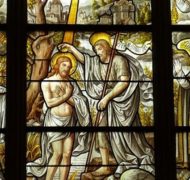God at Work: Seeing and Reflecting God the Worker (Genesis 1 and John 14 Sermon Notes)
Sermon Notes / Produced by The High Calling
Scripture
Genesis 1:27-28
27 So God created humankind in his image,
in the image of God he created them;
male and female he created them.
28 God blessed them, and God said to them, “Be fruitful and multiply, and fill the earth and subdue it; and have dominion over the fish of the sea and over the birds of the air and over every living thing that moves upon the earth.” (NRSV)
John 14:12-14
12 Very truly, I tell you, the one who believes in me will also do the works that I do and, in fact, will do greater works than these, because I am going to the Father. 13 I will do whatever you ask in my name, so that the Father may be glorified in the Son. 14 If in my name you ask me for anything, I will do it. (NRSV)
Outline
Theme: We will see and reflect God in our work by connecting our hearts to our hands.
How?
Recovering a sense of Vocation: Your work is as holy as Christ’s work.
Understanding the Incarnation: God’s Spirit is at work in you as much as he was in Christ.
Conclusion: Our purpose is nothing less than reflecting God’s work in our work.
Sermon Development
Have you ever had a really crummy job? I once worked for several months erasing stray pencil marks off of standardized scan-tron tests for a school district. I mean it was really bad. Someday at a party have people go around the room and tell about the worst job they ever had. And then, you know what, you’ll find that everyone of them would take that job a dozen times over being unemployed, right?
You see, even aside from needing a job to make money, all of us need to work. Work is important to us. If you read the passage from Genesis 1, you can see that we were made for work. Now, let’s be clear that when we are talking about work, we are not limiting that to a job. Work is not limited to what we’d call our jobs. Our job is what we do to put bread on the table and a roof over our heads. A job is what we do for a paycheck. Our work is what we do for a purpose. And for only some of us, they are one and the same.
In his classic book, Working, author Studs Terkel lets dozens of people tell about their work in their own< words. One of his respondents, Nora Watson, made an incisive and insightful comment. She said: “I think most of us are looking for a calling, not a job. Most of us, like the assembly line worker, have jobs that are too small for our spirit. Jobs are not big enough for people.”[1]
If you have ever had a job too small for your spirit or felt your spirit begin to wither without work, then you also understand that according to Genesis chapter 3, one of the great tragedies of the fall of humanity into sin is that work is cursed and that we must overcome the effects of the fall to have our work be all that God intended.
And that is what this message is about. It is about seeing the presence of God in your work and reflecting the presence of God through your work. It is about recovering a biblical understanding of work in which all that we do with most of the hours of our lives becomes an expression of the purpose, partnership, and portrayal of God that we were made for.
My theology professor, Ray Anderson, was raised as a farmer in South Dakota. When he was a boy, working on the farm one day, his father grabbed him by the hand, bent down and stuck his hand in the soil. “This land is your life, son. Stay connected to it and all will go well with you.” Ray grew up and for a time was a farmer, but then he became a pastor and a teacher of theology. Ray reflected years later, “My father tried to connect my hand to the land. But what he did, and for what I am eternally grateful, was connect my heart to my hand. For from that day, kneeling in the dirt to this day, whatever my hands have touched, my heart has embraced.”
I believe that Dr. Anderson describes perfectly what work from God’s perspective is supposed to be all about. It is having our hands connected to our hearts. It is working each day with the deep awareness that whatever you touch or hold in your hand, think upon or set your mind to, engage with your abilities or invest your resources in should be an expression of and deeply connected to the innermost place within you where God dwells and guides.
Theme: We will see and reflect God in our work by connecting our hearts to our hands. But how?
Let me suggest two ancient words and offer them to you in a fresh way. They are the Latin words, vocatio, and incarnatio. Or in English, vocation and incarnation, calling and embodiment. We will reconnect our hearts to our hands, our work to God’s work, by recovering a sense of vocation and understanding the incarnation.
Recovering a sense of Vocation: Your work is as holy as Christ’s work.
Vocation, or “calling,” is a key component of current Christianity. You see, before the Reformation, there was a tendency to break the world into “secular” and “sacred.” That is, priests, monks, and bishops had vocations or callings, and everybody else just had a job.
But Calvin and the other Reformers disputed that. They asserted that everyone was called by God to work for Christ wherever they are and that ministry is no more holy than marketing. Indeed, Calvin put it this way: “The Lord bids each of us in all life’s actions to look to his calling. He has appointed duties for every (person) in his particular way of life…he has named these various kinds of livings ‘callings.’ Therefore, each individual has his own kind of living assigned to him by the Lord as a sort of sentry post so that he may not heedlessly wander about throughout life.” (Inst. 3.10.6)
For Calvin, your work is your “sentry post.” The place where you spend your day, whether it is volunteering at the hospital, waiting tables, practicing law, teaching school, or caring for your kids, is your post where you are assigned to do your work for the sake of Christ in the world.
This means that the key question of all people and not just college freshmen is “what am I to do with my life?” What is God calling me to do? Where is God assigning me to work for him? In this season of my life, where is my post?
Remember. Our work, if it is a calling, is as important as Christ’s because we are fulfilling God’s original mandate from Genesis chapter 1. We are being God’s image in the world, representing him, portraying and revealing him, reflecting him. Humans from the very beginning were called to reflect God in the world and that work, wherever we do it, is holy work.
So, first we need to reconnect our hearts with our hands and recover a sense of vocation. Second, we need to truly understand the incarnation.
Understanding the Incarnation: God’s Spirit is at work in you as much as he was in Christ. In John 1, we read that in Christ, God became flesh and dwelt among us. The doctrine of the incarnation is the way that we affirm that God came to this earth with a job to do. Jesus came to call the sinners to repentance, to proclaim and demonstrate the Kingdom of heaven, to die on the cross for the sins of the world, to rise from the dead and conquer death. This was Jesus’ work. But in John 14:12, we read: 12 Very truly, I tell you, the one who believes in me will also do the works that I do and, in fact, will do greater works than these, because I am going to the Father.
Jesus said that his followers will do greater works than he did. How? Because through the Spirit, the church will continue God’s work in the world more broadly than Jesus could ever do as one person.
When we understand that we together as the church are the incarnation of God in the world today, then we begin to realize the very same Spirit of God that was in Jesus is in us. Our work, then, becomes very important. And so we, no less than Jesus, must grapple with the call of God, must call upon God in prayer, and fulfill the will of God in obedience. We must be like Jesus who said of his own work, “I only do what the Father tells me to do.”
Not too long ago, it seemed like every Christian I met was either wearing on their arm or sporting on their bumpers something with the letters WWJD, remember? WWJD stands for “What would Jesus do?” Those who wore it were committing themselves to ask in every situation, “What would Jesus do?” and then do that. It’s a fine idea and inspiring to say the least.
But, to be frank, I think, “What would Jesus do?” is the wrong question to ask. Because it is a hypothetical question that we ask, expect ourselves to answer rightly, and then carry out. While it’s well intentioned, I think there is another more direct, more biblical rooted and more potentially life-changing question, NOT “What would Jesus do?” but “What would Jesus have me do?” Or put even better, “Jesus, what would you have me do?”
You see, once we realize that God is at work in us, through the Spirit, in the same way that he was in Jesus, then we begin to believe that God will speak to us, guide our lives, empower us to faithfulness, and accomplish his will in us in the same way that he did in Jesus.
Not WWJD but, what would Jesus have me do? And this question leads us to the final reality about work.
Conclusion: Just like Jesus, our purpose is nothing less than reflecting God’s work in our work.
Before we can see God at work in our work, we must see our own work differently.
On the former Washington, D.C., city post office (now the site of the Smithsonian Institution’s National Postal Museum) is a plaque that offers different ways of seeing just one occupation, that of postal carrier.
Messenger of Sympathy and Love
Servant of Parted Friends
Consoler of the Lonely
Bond of the Scattered Family
Enlarger of the Common Life
Carrier of News and Knowledge
Instrument of Trade and Industry
Promoter of Mutual Acquaintance, of Peace and of Goodwill Among Men and Nations
Imagine how differently postal carriers would think about themselves if this were their perspective. If they had a sense that they were serving God at their post, being part of God’s work in the world with every step, every delivery, at every house. Not only postal clerks, but all of us need to reconnect our hearts to our hands so that we might see and reflect God in our everyday lives.
*********************************************************************************************************
Tod Bolsinger has been the Senior Pastor of San Clemente Presbyterian Church in San Clemente, California, since 1997. Previously he served for ten years at First Presbyterian Church of Hollywood. He earned a Ph.D. in Theology and Master of Divinity from Fuller Theological Seminary. He teaches for Fuller Seminary and Denver Seminary, is the author of two books, It Takes a Church to Raise a Christian and Showtime, blogs at http://bolsinger.blogs.com, and consults for TAG Consulting.
Click here for a PDF of this sermon.
Other sermons in this series on God at Work:











